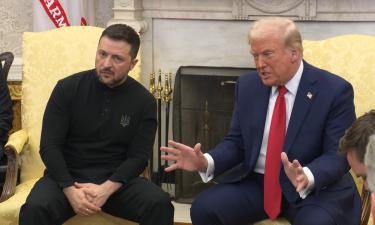Bush to hold talks with EU leaders on future of Iraq
President Bush is seeking solidarity on Iraq with allies who opposed the war, hoping to give a strong vote of confidence to the fledgling government in Baghdad in the face of rampant violence and bloodshed. In the first of two summits over five days, Bush and leaders of the 25-nation European Union were expected to close ranks Saturday with a pledge to reduce Iraq's massive foreign debt, estimated at $120 billion.
Meeting at Dromoland Castle in the west of Ireland, Bush planned to urge the EU offer membership to Turkey, a key U.S. ally in the war against terror.
According AP, thousands of demonstrators marched through Dublin on Friday to protest Bush's summit with the EU chiefs. The crowd of about 10,000 waved placards and banners denouncing Bush as a warmonger and urging that facilities for American military flights be withdrawn from Shannon Airport, a strategic refueling point used by thousands of U.S. troops each month.
About 4,000 police officers and 2,000 soldiers – more than one-third of the security forces in the Irish Republic – were deployed to protect Bush. Weekend protests were expected in several European cities.
From Ireland, Bush heads to Turkey where he will join leaders of the 26-nation NATO alliance at summit talks Monday and Tuesday focused on Iraq. Administration officials expressed confidence that NATO would accept a bigger role in Iraq, offering to train security forces and provide equipment.
The United States had once hoped NATO would send peacekeeping troops to Iraq, but that idea died under fierce opposition from France and Germany.
While last year's war caused major divisions, the United States and its European allies appear intent on joining together to help Iraq's interim government, which takes power Wednesday from the American-led occupation.
"We've had difficulties over the last year, principally related to the military intervention in Iraq," said European Union External Affairs Commissioner Chris Patten. He said the war led "to a period of friction between Europe and the United States, but that there no longer is any point in continuing to focus on passionate arguments about intervention in Iraq."
With violence spreading and casualties climbing, Iraq is a major headache for Bush. Four months before Election Day, he has slumped in the polls at home, and the latest surveys find that a majority of Americans believe it was a mistake to invade Iraq.
Bush used his weekly radio address Saturday to stress that the international community has a responsibility to promote the rise of a free Iraq.
"Today, the nations of the European Union pledged their support for the new government of Iraq," he said. "Next week, at the NATO summit, we will discuss Iraqi Prime Minister (Iyad) Allawi's request for NATO help in training Iraq's security forces."
Bush added: "NATO has the capability to help the Iraqi people defeat the terrorist threat facing their country. As Iraq moves toward the transfer of sovereignty next week, NATO, the European Union and the United States are united in our determination to help the people of that nation."
Eager to show progress, Bush plans a speech in Istanbul on Tuesday to trumpet the turnover of power. While the transfer will put an Iraqi face on the government, some 135,000 American troops will remain in the country to provide security.
This year's U.S.-EU summit is the first to be held since the EU enlarged from 15 countries to 25 on May 1.
On the economic side, the United States and the EU are expected to sign a cooperation agreement that will allow Europe's Galileo satellite system to go forward. The Galileo program is a joint venture of the European Commission and the European Space Agency and will be Europe's answer to the American global positioning system, or GPS.
The European satellite system is expected to be operational by 2008 and will be the first satellite navigation system designed specifically for civilian use worldwide. The U.S. GPS system and a Russian system were originally designed for military use.
Subscribe to Pravda.Ru Telegram channel, Facebook, RSS!





